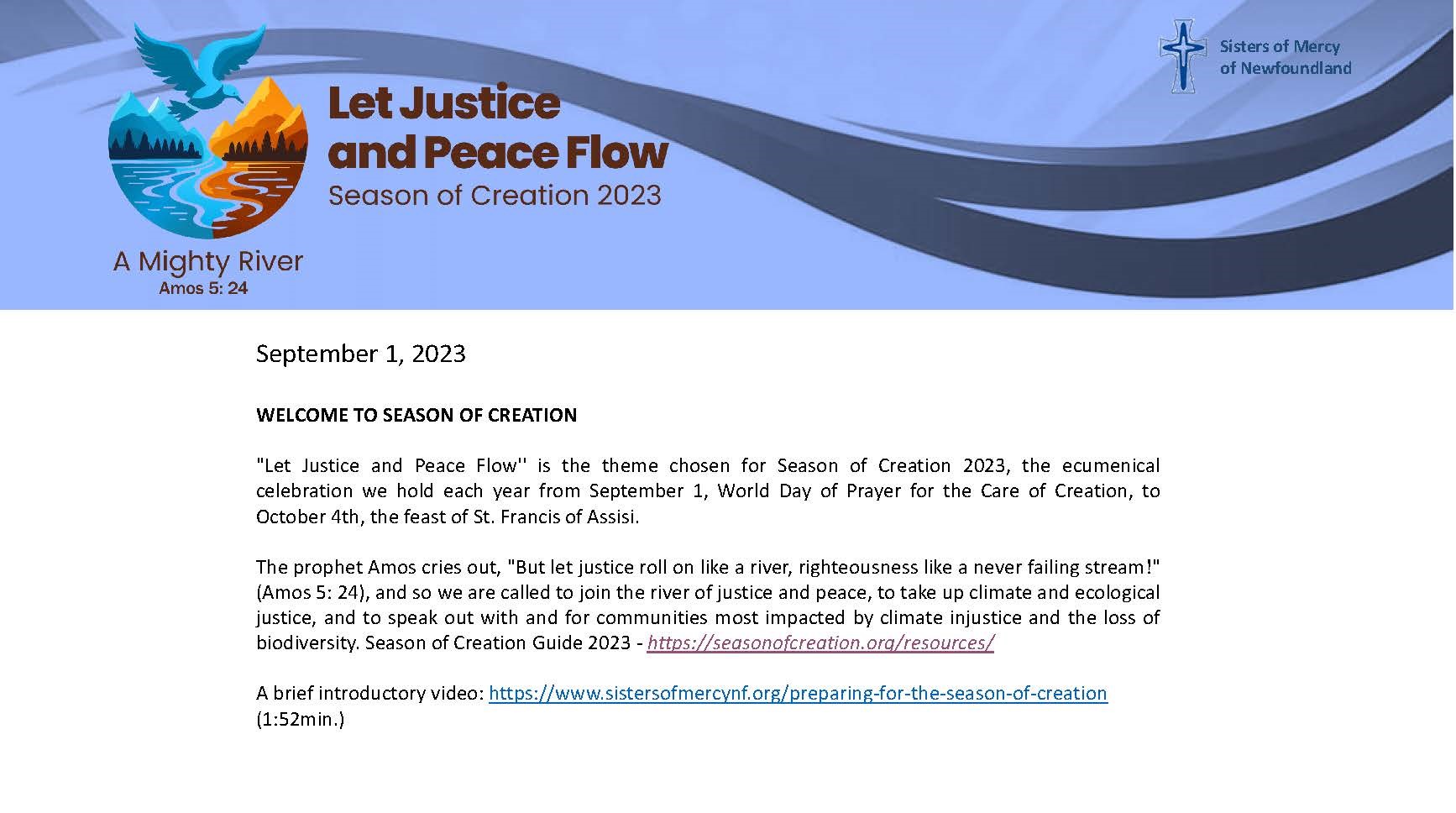
…………………………………………………………………………………………………………………………………….
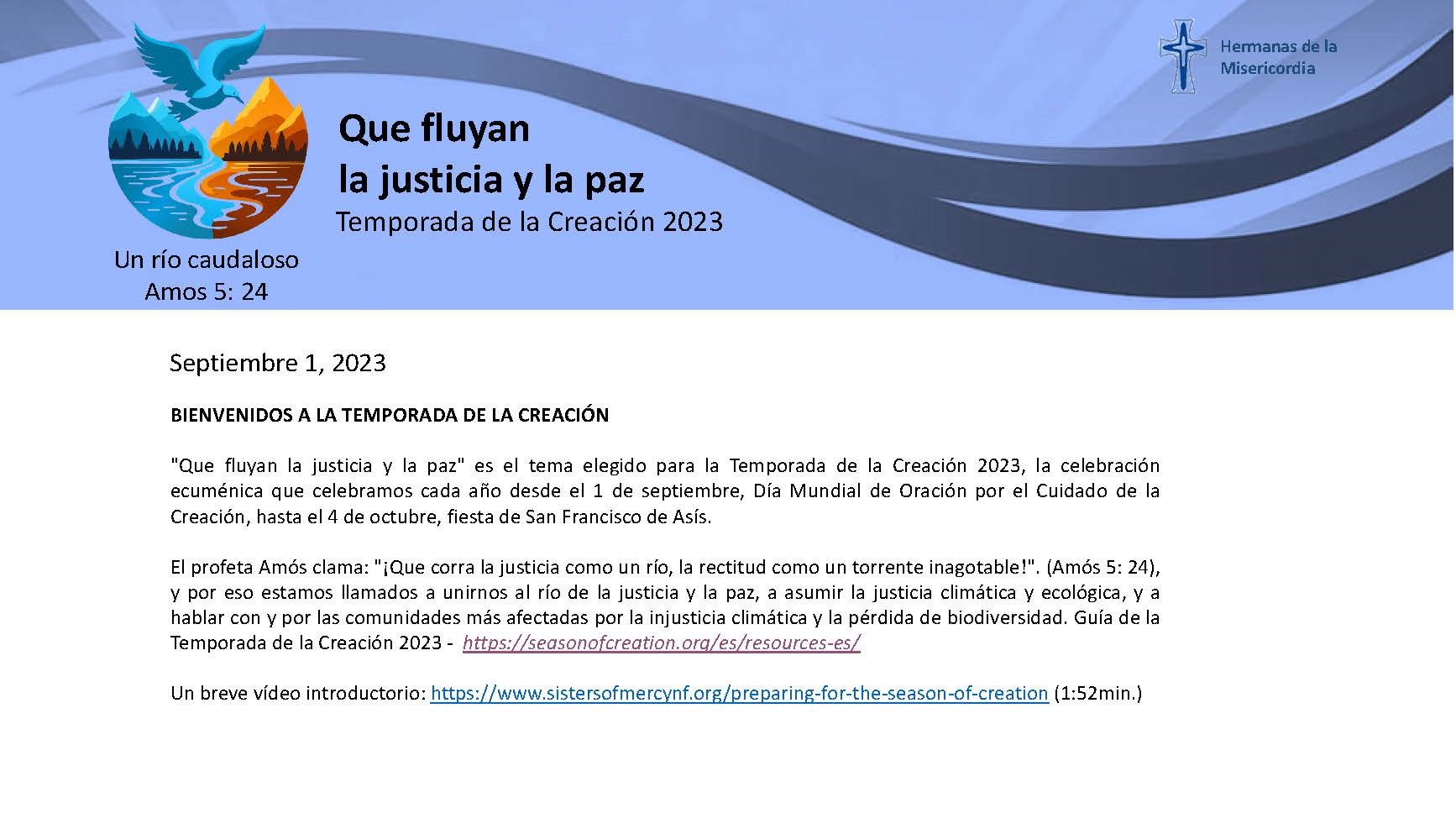

…………………………………………………………………………………………………………………………………….

Join us in prayer each day this Season of Creation.
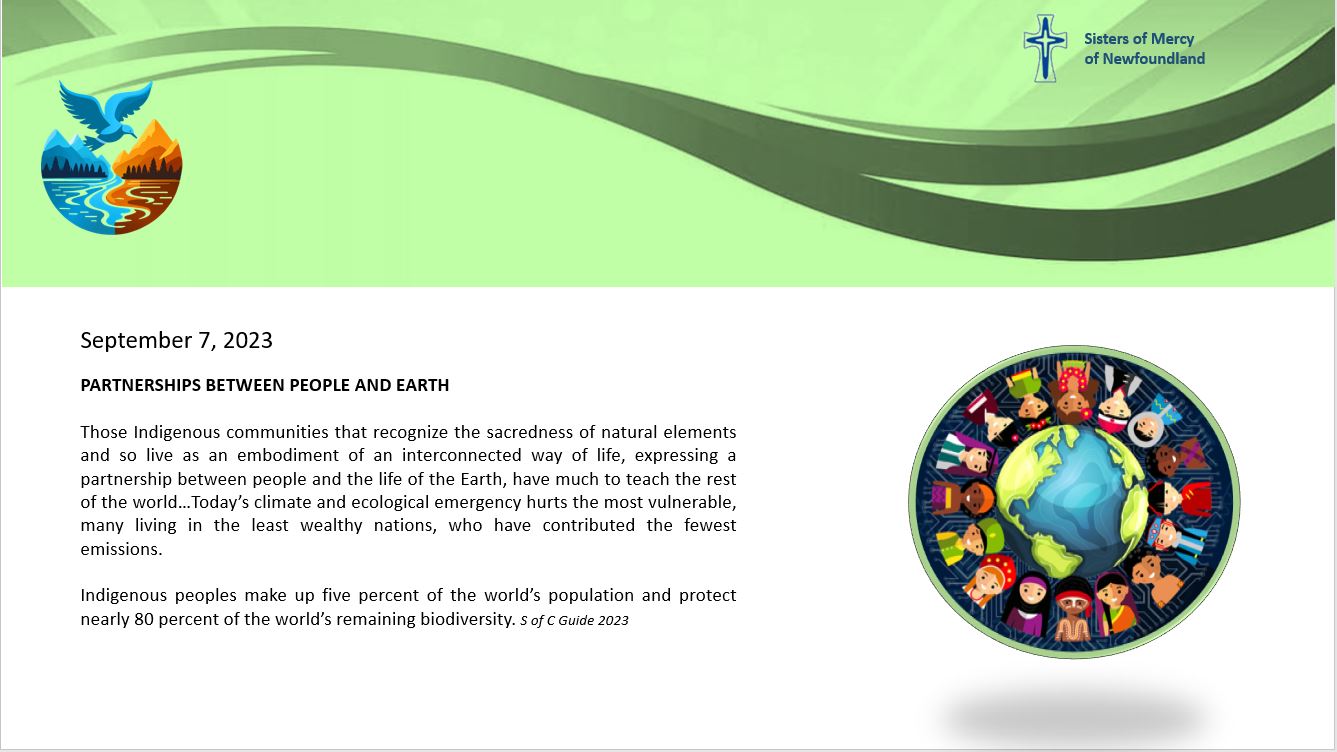
_________________________________________________________________________________________________________________________
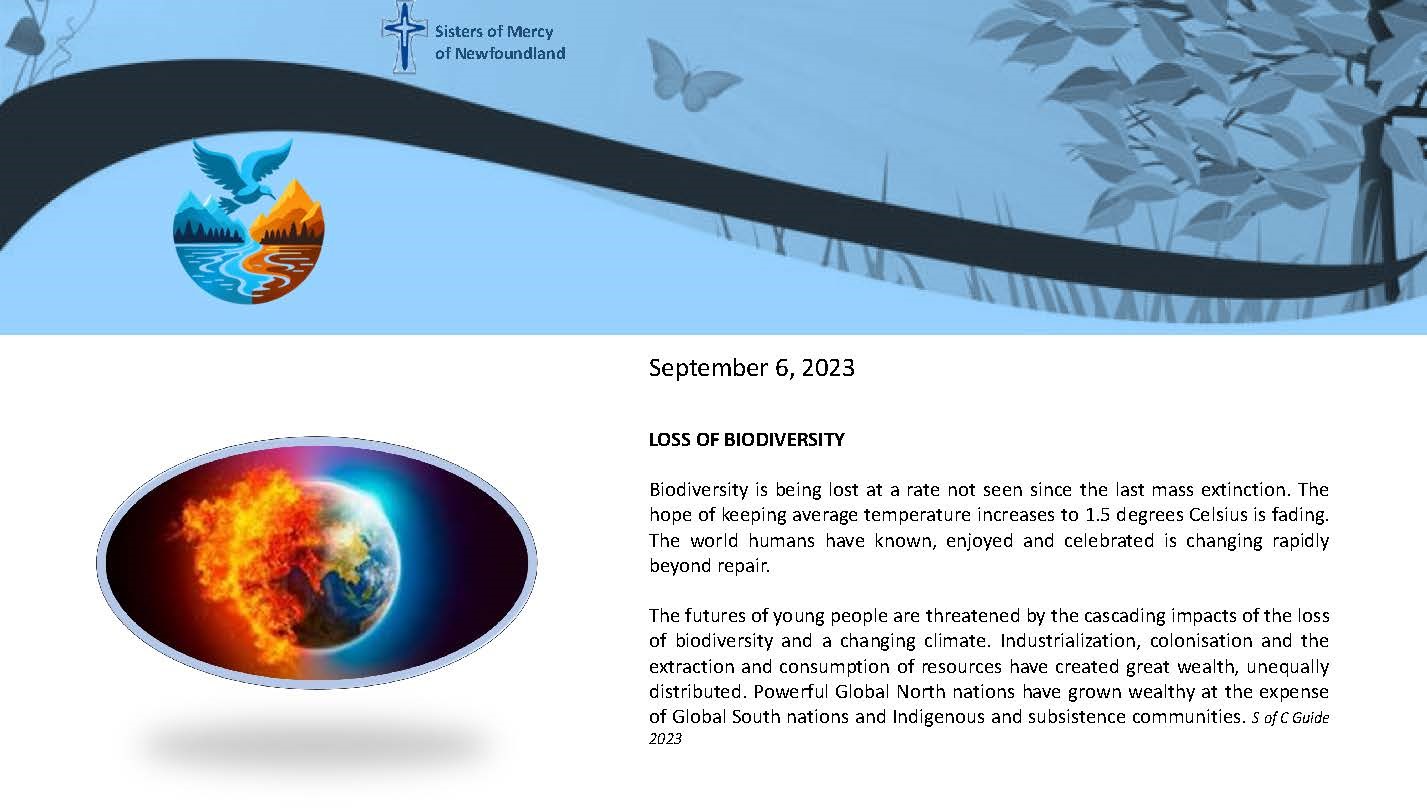
_________________________________________________________________________________________________________________________
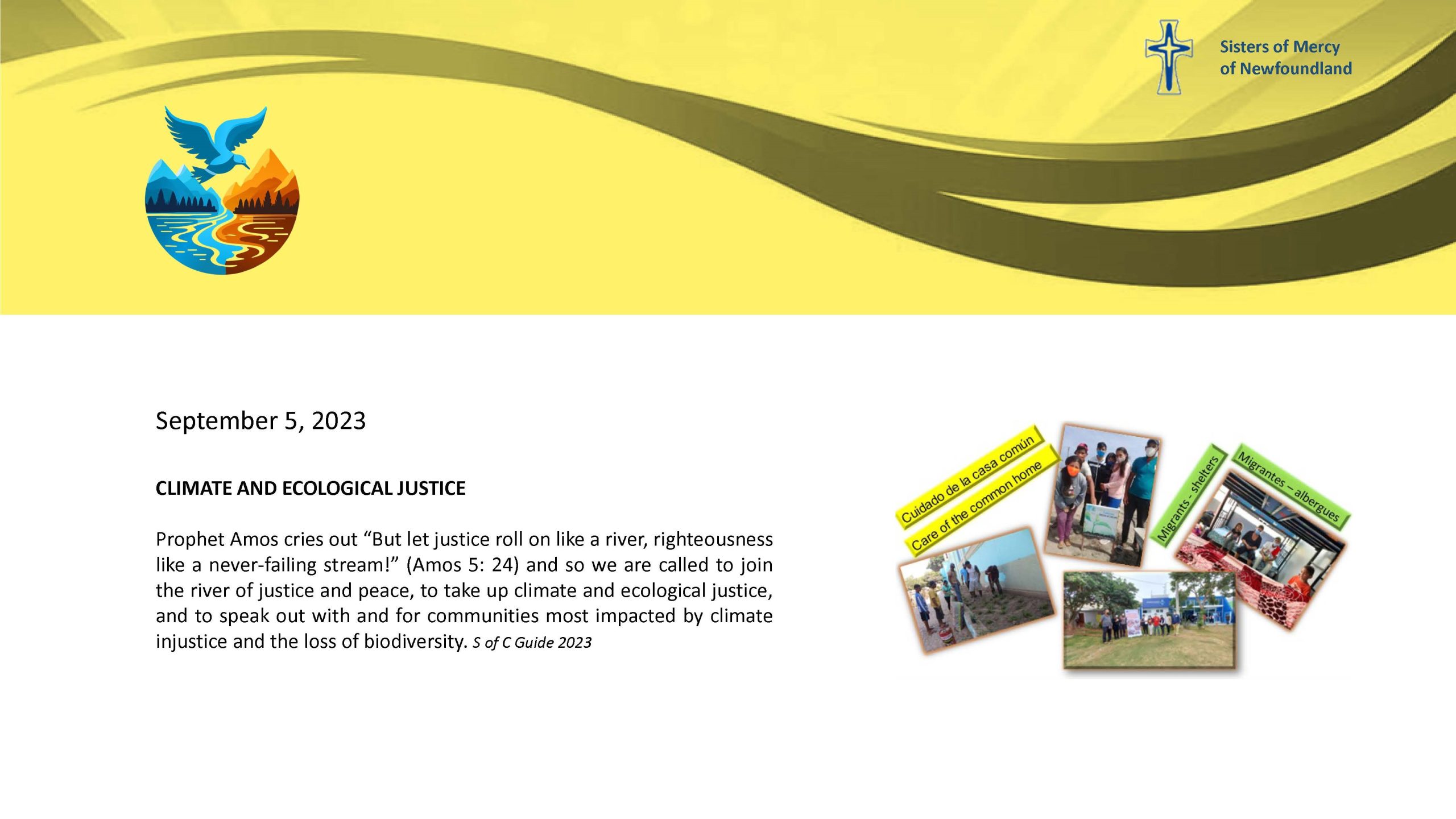 _____________________________________________________________________________________________________________________________
_____________________________________________________________________________________________________________________________

________________________________________________________________________________________________________________________
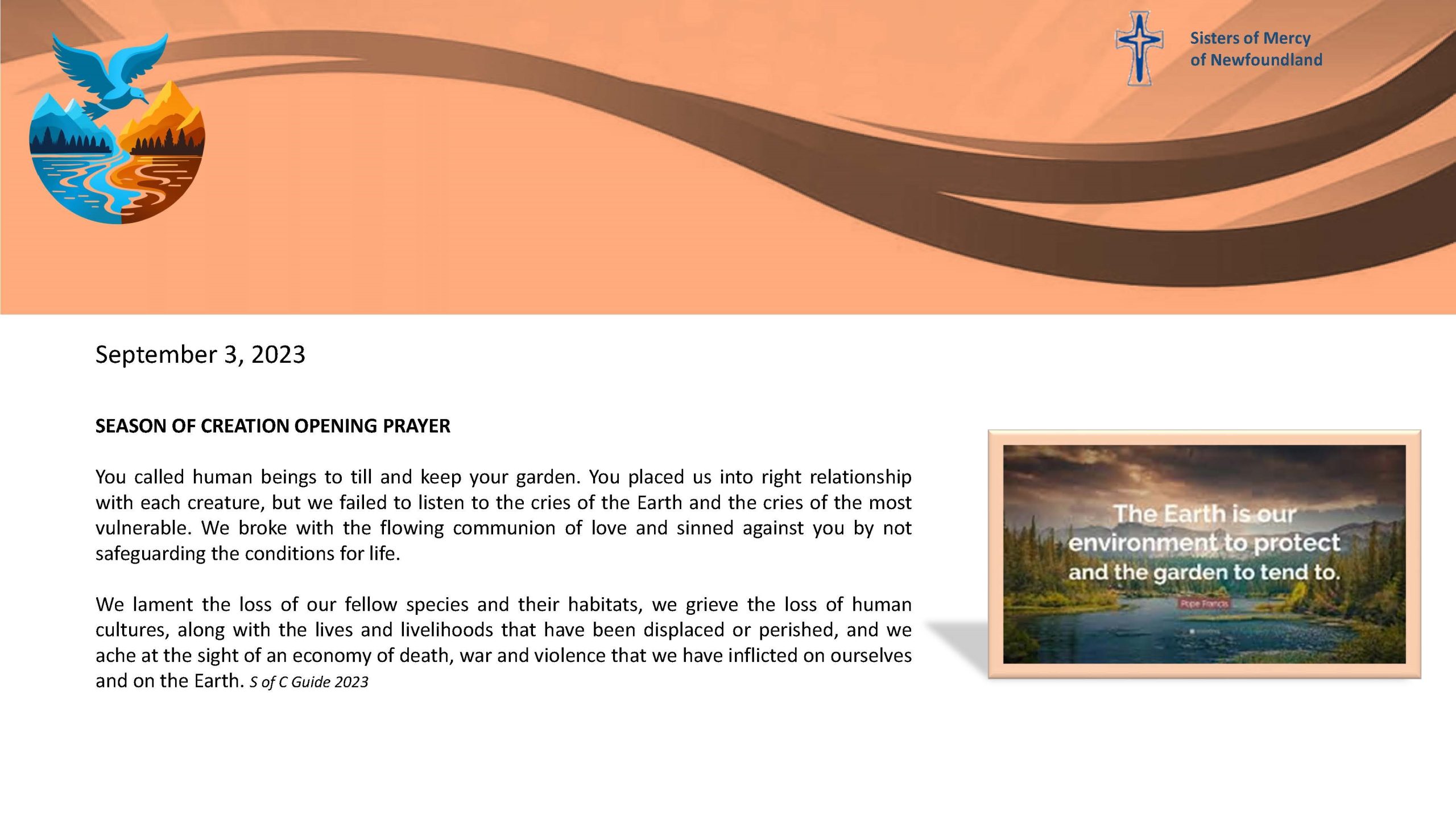
_______________________________________________________________________________________________________________________________
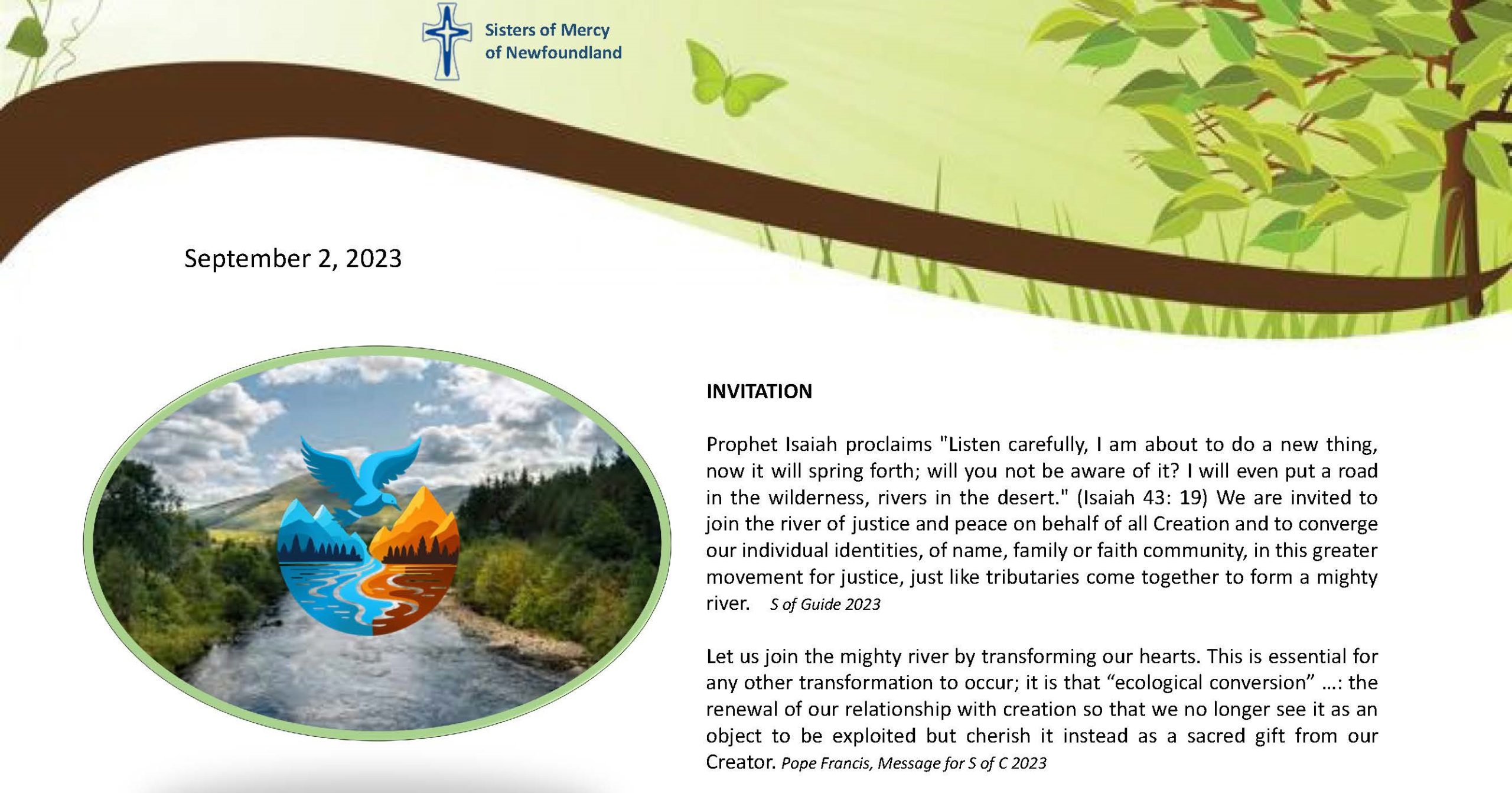
Pope Francis requests prayer and action for those “for those people who live on the margins of society in subhuman living conditions, that they may not be neglected by institutions and never be cast out.”
He asks “How is it that we allow the ‘throwaway culture,’ in which millions of men and women are worth nothing compared to economic goods, to dominate our lives?” “Please,” the Pope implores, “let’s stop making invisible those who are on the margins of society, whether it’s due to poverty, addictions, mental illness or disability.”
Post your prayer for peace in our sacred space here
El Papa Francisco pide oración y acción por “las personas que viven al margen de la sociedad en condiciones de vida infrahumanas, para que no sean desatendidas por las instituciones y nunca sean expulsadas.”
Y pregunta: “¿Cómo es posible que permitamos que la “cultura del descarte”, en la que millones de hombres y mujeres no valen nada en comparación con los godos económicos, domine nuestras vidas?” “Por favor”, implora el Papa, “dejemos de hacer invisibles a quienes están al margen de la sociedad, ya sea por pobreza, adicciones, enfermedades mentales o discapacidades.”
Publica aquí tu oración por la paz en nuestro espacio aquí
Each year from September 1, the World Day of Prayer for Creation to October 4, the feast of St. Francis of Assisi, Christians all over the world are called to unite in prayer and action for our common home.
 The theme of this year’s Season of Creation is Let Justice and Peace Flow, based on Amos 5:24, where Amos uses the image of a mighty river to symbolize Justice. In his 2023 Creation Day message, Pope Francis asks that we “join the mighty river by transforming our hearts.” He goes on to say that this requires an ecological conversion and an integral approach to respect for the environment that involves relationship with God, with our sisters and brothers of today and into the future, with all of nature and with ourselves. He speaks of the synodal process in which our church is engaged as an invitation to all on this transformative journey to “coalesce in a majestic river of reflection and renewal” like the tributaries in nature which flow into and are absorbed into the mighty river.
The theme of this year’s Season of Creation is Let Justice and Peace Flow, based on Amos 5:24, where Amos uses the image of a mighty river to symbolize Justice. In his 2023 Creation Day message, Pope Francis asks that we “join the mighty river by transforming our hearts.” He goes on to say that this requires an ecological conversion and an integral approach to respect for the environment that involves relationship with God, with our sisters and brothers of today and into the future, with all of nature and with ourselves. He speaks of the synodal process in which our church is engaged as an invitation to all on this transformative journey to “coalesce in a majestic river of reflection and renewal” like the tributaries in nature which flow into and are absorbed into the mighty river.
On 4 October Pope Francis will release a follow-up document to his 2015 encyclical Laudato Si’ in an effort to help “put an end to the senseless war against our common home”.
October 4 also marks the opening of the first session of the Synod, the meeting of the universal Catholic Church, in Rome. Read more here.
Cada año, desde el 1 de Septiembre, Jornada Mundial de Oración por la Creación, hasta el 4 de Octubre, fiesta de San Francisco de Asís, los Cristianos de todo el mundo son llamados a unirse en oración y acción por nuestra casa común.
El tema del Tiempo de la Creación de este año es Que fluyan la justicia y la paz, basado en Amós 5:24, donde Amós utiliza la imagen de un río caudaloso para simbolizar la justicia. En su mensaje del Día de la Creación 2023, el Papa Francisco pide que “nos unamos al caudaloso río transformando nuestros corazones”. Continúa diciendo
que esto requiere una conversión ecológica y un enfoque integral del respeto del medio ambiente que implique una relación con Dios, con nuestros hermanos y hermanas de hoy y del futuro, con toda la naturaleza y con nosotros mismos. Habla del proceso sinodal en el que está comprometida nuestra Iglesia como una invitación a todos en este viaje transformador a “confluir en un majestuoso río de reflexión y renovación” como los afluentes de la naturaleza que desembocan y son absorbidos por el caudaloso río.
El 4 de octubre, el papa Francisco publicará un documento de seguimiento de su encíclica de 2015 Laudato Si’ en un esfuerzo por ayudar a “poner fin a la guerra sin sentido contra nuestra casa común”.
El 4 de octubre también marca la apertura de la primera sesión del Sínodo, la reunión de la Iglesia católica universal, en Roma. Más información aquí.
In a very short time from now, Sister Elizabeth Davis, Sister of Mercy, will leave Newfoundland and Labrador to attend the Synod on Synodality in Rome. The call of the Synod is to: Communion, Participation and Mission.
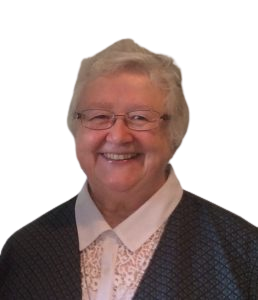 Elizabeth will be among 364 voting members in the 16th Ordinary General Assembly of the Synod and one of two Sisters of Mercy who will be voting members. The second Sister of Mercy is Sister Angela Perez from Guam, a member of the Institute of the Sisters of Mercy of the Americas.
Elizabeth will be among 364 voting members in the 16th Ordinary General Assembly of the Synod and one of two Sisters of Mercy who will be voting members. The second Sister of Mercy is Sister Angela Perez from Guam, a member of the Institute of the Sisters of Mercy of the Americas.
For the first time, laypeople will not only participate in the Synod of Bishops’ assembly but also will be full members, with the ability to vote on a final document at the end of the process in October 2024. More than 50 women will be voting members in the assembly scheduled for October 4–29, 2023, at the Vatican. Elizabeth is among five women religious chosen through the International Union of Superiors General (UISG) as voting members. Other women religious, including Sister Angela, have been named by the Conferences of Bishops.
During the nearly month-long Vatican assembly, the delegates will discuss questions posed in the recently released document Instrumentum Laboris, which covers such controversial topics as women deacons, priestly celibacy, and LGBTQ outreach and highlights a desire for new institutional bodies to allow for greater participation in decision-making by the “People of God.”
The 50-page document was written in April and May 2023 and approved by Pope Francis. The text itself stresses that it is “not a document of the Church’s Magisterium, nor is it the report of a sociological survey” but instead presents the “priorities that emerged from listening to the People of God” in the global Synod process thus far. The full text is available here.
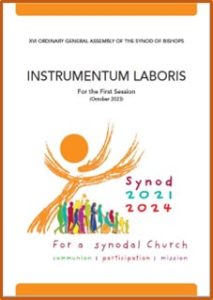 This document has two parts. Part One summarizes the insights gained from the listening sessions at the diocesan, national and continental levels, and outlines the vision of what a synodal church is and how it should proceed.
This document has two parts. Part One summarizes the insights gained from the listening sessions at the diocesan, national and continental levels, and outlines the vision of what a synodal church is and how it should proceed.
Part Two is comprised of a series of fifteen worksheets intended to guide the small group discussions at the assembly. The text outlines a “synodal method” of spirituality focused on listening to the Spirit and discerning the “signs of the times.”
In a change from recent Synods, Pope Francis has extended the timeframe of the Synod over three years (2021 to 2024) and has divided the general assembly into two sessions, one to be held in October 2023 and the second in October 2024. According to Cardinal Mario Grech, the head of the Vatican’s Synod office, conclusions will be reached only after the second and final session in 2024. At the end of the process in 2024, Synod assembly participants will vote on an advisory final document that will be presented to the pope, who can decide, if he wishes, to adopt the text as a papal document or to write his own at the conclusion of the Synod.
Canadian Bishops attending are Archbishop J. Michael Miller, C.S.B., Archdiocese of Vancouver; Bishop William T. McGrattan, Diocese of Calgary and Vice President of the Canadian Conference of Catholic Bishops; Bishop Marc Pelchat, Archdiocese of Quebec; Bishop Raymond Poisson, Bishop of Saint-Jérôme-Mont-Laurier and President of the Canadian Conference of Catholic Bishops; and Cardinal Gérald C. Lacroix, Archdiocese of Quebec.
In addition to the five Canadian Bishops, Canadian voting members representing the wider church are: Sami Aoun, Nominee of the Maronite, Melkite, and Syriac Catholic Churches in Canada; Catherine Clifford, Archdiocese of Gatineau, QC; Sr. Chantal Desmarais, scsm, Diocese of Joliette, QC; Linda Staudt, Diocese of London, ON; and Sister Elizabeth Davis rsm, Archdiocese of St. John’s, NL.
We congratulate Elizabeth for having responded so generously and courageously to this historic and very sacred invitation to participate in the Synod of the universal church and for being the voice of people in all their diversity and of all creation (which we know she will be!). We wish her well in the many demands of travel, “living out of a suitcase,” preparation, meetings, discussions, participation, and collaboration with representatives from around the world. We are proud and grateful that Elizabeth will participate in the Synod. We know that she will have great influence in her contribution to the Synod for the church and for the sake the world over the next year and beyond.
We offer this prayer for Elizabeth and for the Synod:
Holy and Triune God, we thank you for calling us to be Your Church,
and for showing her newer and more relevant ways of being
the Sign and Sacrament of God.
As the Synodal journey which began two years ago,
finds its culmination in the Synodal Event in October 2023,
we pray for a more intense experience of Your Spirit for all the faithful.
We thank you for blessing the Synodal preparatory work in communities,
institutions and by individuals.
May the significant event of the Synod open new doors for the Church
in her self-understanding and mission.
May the Synod remain open to grace, and approach all things
with humility and courage.
Dispose it to hear “what the Spirit is saying to the Church” (Rev 3:22)
and where the Spirit is blowing it to action. Amen.
-Sr. Mary John Kudiyiruppil, SSpS
Dentro de muy poco, la Hermana Elizabeth Davis, Hermana de la Misericordia, dejará Terranova y Labrador para asistir al Sínodo sobre la Sinodalidad en Roma. La llamada del Sínodo es: Comunión, Participación y Misión.
Elizabeth será uno de los 364 miembros con derecho a voto en la 16ª Asamblea General Ordinaria del Sínodo y una de las dos Hermanas de la Misericordia que serán miembros con derecho a voto. La segunda Hermana de la Misericordia es la Hermana Ángela Pérez, de Guam, miembro del Instituto de las Hermanas de la Misericordia de las Américas.
Por primera vez, los laicos no sólo participarán en la asamblea del Sínodo de los Obispos, sino que serán miembros de pleno derecho, con capacidad para votar un documento final al término del proceso en octubre de 2024. Más de 50 mujeres serán miembros con derecho a voto en la asamblea prevista del 4 al 29 de octubre de 2023 en el Vaticano. Elizabeth es una de las cinco religiosas elegidas a través de la Unión Internacional de Superioras Generales (UISG) como miembros con derecho a voto. Otras religiosas, entre ellas Sor Angela, han sido nombradas por las Conferencias Episcopales.
Durante la asamblea vaticana, de casi un mes de duración, los delegados debatirán las cuestiones planteadas en el documento Instrumentum Laboris, publicado recientemente, que abarca temas tan controvertidos como las mujeres diáconos, el celibato sacerdotal y el alcance LGBTQ, y destaca el deseo de que los nuevos órganos institucionales permitan una mayor participación en la toma de decisiones del “Pueblo de Dios.”
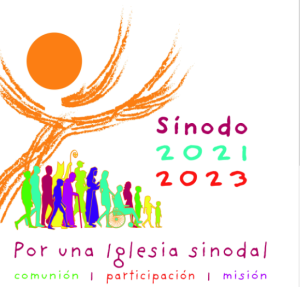 El documento, de 50 páginas, fue redactado en abril y mayo de 2023 y aprobado por el Papa Francisco. El propio texto subraya que “no es un documento del Magisterio de la Iglesia, ni el informe de una encuesta sociológica”, sino que presenta las “prioridades surgidas de la escucha del Pueblo de Dios” en el proceso global del Sínodo hasta ahora. El texto completo está disponible aquí.
El documento, de 50 páginas, fue redactado en abril y mayo de 2023 y aprobado por el Papa Francisco. El propio texto subraya que “no es un documento del Magisterio de la Iglesia, ni el informe de una encuesta sociológica”, sino que presenta las “prioridades surgidas de la escucha del Pueblo de Dios” en el proceso global del Sínodo hasta ahora. El texto completo está disponible aquí.
El documento consta de dos partes. En la primera parte se resumen las conclusiones extraídas de las sesiones de escucha a nivel diocesano, nacional y continental, y se esboza la visión de lo que es una Iglesia sinodal y cómo debería proceder.
La segunda parte se compone de una serie de quince fichas destinadas a orientar los debates en pequeños grupos durante la asamblea. El texto esboza un “método sinodal” de espiritualidad centrado en la escucha del Espíritu y el discernimiento de los “signos de los tiempos”.
En un cambio respecto a Sínodos recientes, el Papa Francisco ha ampliado el calendario del Sínodo a tres años (2021 a 2024) y ha dividido la asamblea general en dos sesiones, una que se celebrará en octubre de 2023 y la segunda en octubre de 2024. Según el cardenal Mario Grech, jefe de la oficina vaticana del Sínodo, las conclusiones no se alcanzarán hasta después de la segunda y última sesión, en 2024. Al final del proceso, en 2024, los participantes en la asamblea sinodal votarán un documento final consultivo que será presentado al Papa, quien podrá decidir, si lo desea, adoptar el texto como documento pontificio o redactar uno propio al concluir el Sínodo.
Los obispos canadienses asistentes son el arzobispo J. Michael Miller, C.S.B., archidiócesis de Vancouver; monseñor William T. McGrattan, diócesis de Calgary y vicepresidente de la Conferencia Episcopal Canadiense; monseñor Marc Pelchat, archidiócesis de Quebec; monseñor Raymond Poisson, obispo de Saint-Jérôme-Mont-Laurier y presidente de la Conferencia Episcopal Canadiense; y el cardenal Gérald C. Lacroix, archidiócesis de Quebec.
Además de los cinco obispos canadienses, los miembros canadienses con derecho a voto que representan a la Iglesia en general son: Sami Aoun, Nominado de las Iglesias católicas maronita, melquita y siríaca de Canadá; Catherine Clifford, Archidiócesis de Gatineau, QC; Sor Chantal Desmarais, scsm, Diócesis de Joliette, QC; Linda Staudt, Diócesis de London, ON; y Sor Elizabeth Davis rsm, Archidiócesis de St. John’s, NL.
Felicitamos a Elizabeth por haber respondido con tanta generosidad y valentía a esta invitación histórica y muy sagrada de participar en el Sínodo de la Iglesia universal y por ser la voz de las personas en toda su diversidad y de toda la creación (¡lo que sabemos que será!). Le deseamos lo mejor en las muchas exigencias del viaje, de “vivir con una maleta”, de la preparación, de las reuniones, de los debates, de la participación y de la colaboración con representantes de todo el mundo. Estamos orgullosos y agradecidos de que Elizabeth participe en el Sínodo. Sabemos que tendrá una gran influencia en su contribución al Sínodo para la Iglesia y para el bien del mundo durante el próximo año y más allá.
Ofrecemos esta oración por Isabel y por el Sínodo:
Dios Santo y Trino, te damos gracias por llamarnos a ser tu Iglesia,
y por mostrarle formas nuevas y más relevantes de ser
el Signo y Sacramento de Dios.
Mientras el camino sinodal que comenzó hace dos años
encuentra su culminación en el Evento Sinodal de octubre de 2023,
te pedimos una experiencia más intensa de tu Espíritu para todos los fieles.
Te damos gracias por bendecir el trabajo de preparación sinodal en las comunidades
instituciones e individuos.
Que el significativo acontecimiento del Sínodo abra nuevas puertas a la Iglesia
en su autocomprensión y misión.
Que el Sínodo permanezca abierto a la gracia y se acerque a todas las cosas
con humildad y valentía.
Que se disponga a escuchar “lo que el Espíritu dice a la Iglesia” (Ap 3,22)
y para que el Espíritu la impulse a la acción. Amén.
-Sr. Mary John Kudiyiruppil, SSpS
Sister M. Joseph Fox is remembered as one of the most outstanding educators in our Newfoundland Mercy history.
 Irish-born Jane Fox arrived in St. John’s on October 21, 1881 to join the Sisters of Mercy, was received as Sister M. Joseph in March of 1882 and made profession of vows in April of 1884. She spent most of her religious life at Mercy Convent on Military Road, first teaching at Angels’ Guardian School and then at Our Lady of Mercy School, later known as Our Lady of Mercy Academy. Her reputation as an excellent teacher spread far and wide.
Irish-born Jane Fox arrived in St. John’s on October 21, 1881 to join the Sisters of Mercy, was received as Sister M. Joseph in March of 1882 and made profession of vows in April of 1884. She spent most of her religious life at Mercy Convent on Military Road, first teaching at Angels’ Guardian School and then at Our Lady of Mercy School, later known as Our Lady of Mercy Academy. Her reputation as an excellent teacher spread far and wide.
In 1898 Sister M. Joseph opened Newfoundland’s first commercial school with only one typewriter and five students. Despite the doubts expressed by many people about the wisdom of this venture, she was convinced that the need was there and that the time was right. Her astute business sense, her connections with the local business community and her firm belief that women had a place in the world of business gave her the drive to forge ahead. Her commercial school flourished, attracting students from all over the island. In a relatively short time, banks, offices and other business establishments in and outside St. John’s were looking for graduates of Sister M. Joseph’s school.
Sister M. Joseph was director of the commercial department of Our Lady of Mercy Academy until her sudden death on September 1, 1930. She was eulogized by all the newspapers of the day and tributes poured in from all sectors of the population.
The Daily News of September 4, 1930 spoke of her thus:
The passing of Sister Mary Joseph Fox removes an educationalist
of more than usual note from our midst, one whom the commercial
life of the city owes a great deal …
After her death, a stained-glass window of St. Jospeh was placed in the chapel of
our former Mercy Convent, a gift from a group of Sister M. Joseph’s former students honoring their teacher and mentor.
More about the contribution of Sisters to business education in the province can be read here
La Hermana M. Joseph Fox es recordada como una de las educadoras más destacadas de la historia de la Misericordia de Terranova.
John’s el 21 de octubre de 1881 para unirse a las Hermanas de la Misericordia, fue recibida como Hermana M. Joseph en marzo de 1882 e hizo la profesión de votos en abril de 1884. Pasó la mayor parte de su vida religiosa en el Convento de la Misericordia en Military Road, primero enseñando en la Escuela de los Ángeles Guardianes y luego en la Escuela de Nuestra Señora de la Misericordia, más tarde conocida como Academia de Nuestra Señora de la Misericordia. Su reputación de excelente profesora se extendió por todas partes.
En 1898, la hermana M. Joseph abrió la primera escuela comercial de Terranova con una sola máquina de escribir y cinco alumnas. A pesar de las dudas expresadas por muchas personas sobre la conveniencia de esta empresa, ella estaba convencida de que existía la necesidad y de que era el momento adecuado. Su astuto olfato para los negocios, sus conexiones con la comunidad empresarial local y su firme convicción de que las mujeres tenían un lugar en el mundo de los negocios le dieron el impulso necesario para seguir adelante. Su escuela de comercio floreció y atrajo a estudiantes de toda la isla. En relativamente poco tiempo, bancos, oficinas y otros establecimientos comerciales dentro y fuera de St. John’s buscaban graduadas de la escuela de la hermana M. Joseph.
La Hermana M. Joseph fue directora del departamento comercial de la Academia de Nuestra Señora de la Misericordia hasta su repentina muerte el 1 de septiembre de 1930. Fue elogiada por todos los periódicos de la época y le llovieron homenajes de todos los sectores de la población.
El Daily News del 4 de septiembre de 1930 hablaba así de ella:
El fallecimiento de la Hermana Mary Joseph Fox elimina a una educadora…
a la que la vida comercial de la ciudad debe mucho…
comercial de la ciudad le debe mucho…
Después de su muerte, se colocó una vidriera de San José en la capilla de nuestro antiguo Convento de la Misericordia.
Jospeh en la capilla del antiguo Convento de la Misericordia, regalo de un grupo de antiguas alumnas de la Hermana M. Joseph en honor de su maestra y mentora.
Puede leer más sobre la contribución de las Hermanas a la educación empresarial en la provincia aquí
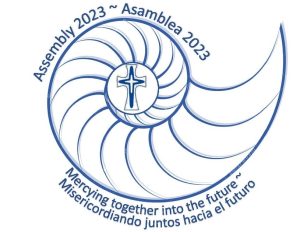 The Sisters of Mercy of Newfoundland have just completed an Assembly, August 21- 23. The theme of the Assembly was “Mercying Together into the Future.”
The Sisters of Mercy of Newfoundland have just completed an Assembly, August 21- 23. The theme of the Assembly was “Mercying Together into the Future.”
Most of the sessions were held by Zoom to accommodate sisters living in Peru and Ontario. On August 21 we invited the whole Congregation (67 of us- more than half already living there – to the Residence at Littledale, 3rd floor) for prayer and socialization. That was the opening of our Assembly. This was the first time we have met together since our last Assembly in 2019.
The next day we gathered via Zoom, with Sr. Catalina Wims, rsm in Ireland to translate Spanish and M. Guy Richard, an employee of the Sisters of Providence in Montreal, Quebec as our Zoom technician. Our meetings were facilitated by Ms. Anne Walsh, a Newfoundland “mercy person” who works mainly with the Redemptorists and the Archdiocese of St. John’s. Our Assembly takes place midway between our Chapters and provides opportunity for the whole Congregation to pray, reflect and converse about the life and mission of the Congregation in its response to our Chapter directions.
Special guests, Margaret Endicott, rsm, Linda Haydock, snjm, were part of two sessions related to ministry and governance. Our own, Elizabeth Davis facilitated a session regarding a new legal entity that will eventually govern and manage our various ministries. In the afternoon of the first day we spent contemplative time viewing a presentation in remembrance of all of our Sisters and Associates who had died.
On August 22 over 60 of us, took part in a beautiful turkey dinner in the main dining room at The Residence at Littledale, where many of our sisters live. We enjoyed a celebratory cake served as dessert. This gave us another opportunity to be together in the one room! We had five sisters among us celebrating their jubilees: Sisters Theresa March and Joan Gosse celebrated 70 years and Sisters Helen Harding, Sylvia Doyle and Rona O’Gorman celebrated 60 years – a grand total of 320 years!
The days were rich and full and we enjoyed a wonderful spirit of interest, engagement, celebration and gratitude. We look forward to ongoing efforts to carry the mandate of our 2021 Chapter forward and prepare for our next Chapter in 2025!
Las Hermanas de la Misericordia de Terranova acaban de terminar una Asamblea, del 21 al 23 de agosto. El tema de la Asamblea fue “Mercying Together into the Future“.
La mayoría de las sesiones se realizaron por Zoom para acomodar a las hermanas que viven en Perú y Ontario. El 21 de agosto invitamos a toda la Congregación (67 de nosotras – más de la mitad ya viviendo allí – a la Residencia en Littledale, 3er piso) para la oración y la socialización. Esa fue la apertura de nuestra Asamblea. Era la primera vez que nos reuníamos desde nuestra última Asamblea en 2019.
Al día siguiente nos reunimos a través de Zoom, con la Hna. Catalina Wims, rsm en Irlanda para traducir al español y M. Guy Richard, un empleado de las Hermanas de la Providencia en Montreal, Quebec como nuestro técnico de Zoom. Nuestras reuniones fueron facilitadas por la Sra. Anne Walsh, una “persona de la misericordia” de Terranova que trabaja principalmente con los Redentoristas y la Archidiócesis de St. Nuestra Asamblea tiene lugar a medio camino entre nuestros Capítulos y ofrece a toda la Congregación la oportunidad de orar, reflexionar y conversar sobre la vida y la misión de la Congregación en su respuesta a las orientaciones de nuestro Capítulo.
Invitados especiales, Margaret Endicott, rsm, Linda Haydock, snjm, formaron parte de dos sesiones relacionadas con el ministerio y el gobierno. Nuestra Elizabeth Davis dirigió una sesión sobre la nueva entidad jurídica que regirá y gestionará nuestros distintos ministerios. Por la tarde del primer día pasamos un tiempo contemplativo viendo una presentación en recuerdo de todas nuestras Hermanas y Asociados fallecidos.
El 22 de agosto, más de 60 de nosotras, participamos en una hermosa cena de pavo en el comedor principal de The Residence at Littledale, donde viven muchas de nuestras hermanas. Disfrutamos de un pastel de celebración servido como postre. Esto nos dio otra oportunidad de estar juntas en la misma habitación. Cinco hermanas celebraron su jubileo: Las Hermanas Theresa March y Joan Gosse celebraron 70 años y las Hermanas Helen Harding, Sylvia Doyle y Rona O’Gorman celebraron 60 años – ¡un gran total de 320 años!
Los días fueron ricos y llenos y disfrutamos de un maravilloso espíritu de interés, compromiso, celebración y gratitud. Esperamos seguir esforzándonos para llevar adelante el mandato de nuestro Capítulo 2021 y prepararnos para nuestro próximo Capítulo en 2025.
ABSTRACT
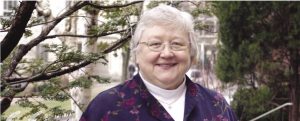 Although she denies it, Sister Elizabeth Davis, a member of the Congregation of the Sisters of Mercy of Newfoundland and Labrador, is becoming a Canadian icon: in education, in healthcare, in leadership development, in social policy and in religious studies, in Canada and abroad. With teaching appointments and participation on many boards and commissions, she leaves a trail of wisdom, quiet successes and vocal fans in her wake. In 2001, she won the Catholic Health Care Association of Canada’s Performance Citation Award and the Canadian Healthcare Association’s Award for Excellence in Distinguished Service. Those were followed by an Honorary Doctor of Laws from Memorial University of Newfoundland, induction into the Alpha Sigma Nu Honour Society of Jesuit Educational Institutions and an appointment as a Member of the Order of Canada in 2004. Recently, the University of Toronto’s Department of Health Policy, Management and Evaluation selected Sister Elizabeth as Leader of the Year for 2006. Ken Tremblay caught up with Sister Elizabeth at St. Augustine’s Seminary in Toronto, where she is currently teaching a course titled Introduction to the Old Testament.
Although she denies it, Sister Elizabeth Davis, a member of the Congregation of the Sisters of Mercy of Newfoundland and Labrador, is becoming a Canadian icon: in education, in healthcare, in leadership development, in social policy and in religious studies, in Canada and abroad. With teaching appointments and participation on many boards and commissions, she leaves a trail of wisdom, quiet successes and vocal fans in her wake. In 2001, she won the Catholic Health Care Association of Canada’s Performance Citation Award and the Canadian Healthcare Association’s Award for Excellence in Distinguished Service. Those were followed by an Honorary Doctor of Laws from Memorial University of Newfoundland, induction into the Alpha Sigma Nu Honour Society of Jesuit Educational Institutions and an appointment as a Member of the Order of Canada in 2004. Recently, the University of Toronto’s Department of Health Policy, Management and Evaluation selected Sister Elizabeth as Leader of the Year for 2006. Ken Tremblay caught up with Sister Elizabeth at St. Augustine’s Seminary in Toronto, where she is currently teaching a course titled Introduction to the Old Testament.HQ: Sister, your life with the Sisters of Mercy has been anything but traditional. From early roots in education, to healthcare leadership, to lifelong learning and doctoral studies, from small-town Newfoundland to international venues, from issues in contemporary society to religious studies of the Old Testament, from shaping minds to shaping policy and planning the future of a province, conversations with your general superior must be interesting?Sister: [Chuckle] To say the least! The sisters have been very supportive of me and my career. They have congratulated me on many occasions, and they constantly challenge me to do more. You might think that they would say “stick to the knitting” and stop wandering. They have recognized that these vocational changes have been important to me. I have been very fortunate to have accumulated these experiences and been grounded in their diversity.
HQ: What has been your proudest moment?
Sister: Actually, I have never thought of that. I guess, in a paradoxical way, it was the experience in St. John’s. Here we were, arguably in Canada’s poorest province, making significant changes in the way we delivered care. Staff in 10 different organizations joined me in making the decisions that were in the best interest of healthcare, and they put those needs ahead of their own interests – the unions, physicians, staff members, managers, volunteers, board members. Witnessing that degree of commitment – people putting aside their personal interests in the best interest of the community, during a very difficult time – was witnessing a triumph of the human spirit. I was proud to be counted among them.
Author: Ken Tremblay. Source: Healthcare Quarterly 10(1) January 2007 : 30-32.doi:10.12927/hcq..18646
Read the complete article here (PDF)
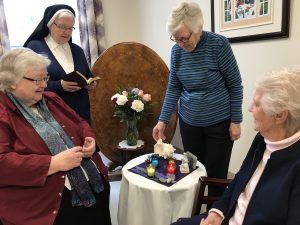 Each Sunday in Advent, Sr. Elizabeth Davis and her fellow Mercy sisters light a candle on their cosmic Advent wreath adorned with shells, pinecones, rocks and colorful ribbons.
Each Sunday in Advent, Sr. Elizabeth Davis and her fellow Mercy sisters light a candle on their cosmic Advent wreath adorned with shells, pinecones, rocks and colorful ribbons.
The four candles symbolize the births of, in order: the universe, the solar system, Jesus Christ and, finally, “the birth of each one of us into the whole cosmic body of the universe,” said Davis, a member of Mercy International Association.
While Christmas is a celebration of God becoming incarnate through the birth of Jesus Christ, theologians consider God’s first act of incarnation to be the birth of the cosmos, inspiring some religious communities to incorporate a cosmic dimension to their seasonal reflections and celebrations. (Davis noted that her community, Sisters of Mercy of Newfoundland, got the idea of a cosmic Advent wreath from the School Sisters of Notre Dame.)
The Mercy sisters are working to democratize the theological language around Christ and the cosmos through Mercy Global Presence, a program that uses art and ordinary language to examine otherwise abstract topics. The online resource for December is themed “Incarnate God in Cosmos and in Person of Jesus.”
“What’s happening now is quite a fundamental shift for ordinary sisters, men, women and children, that we’re starting to understand [the universe] in ways we couldn’t have even 10 years ago,” said Davis, who serves on the guiding team for Mercy Global Presence and as liaison with the 12 congregational leaders of Sisters of Mercy.
“That’s a fundamental shift in our theology, in our spirituality, in how and where we do ministry,” she said.
And a shift in how to think about Christmas…
Read the rest of the article in Global Sisters Report here
A much loved music teacher, Cathedral organist and choir leader who believed in the power of music to help people break through self-imposed limits and develop their capacities, Kathrine Bellamy’s activism extended to facing up to the challenges in combating the social results of extreme poverty in St John’s.
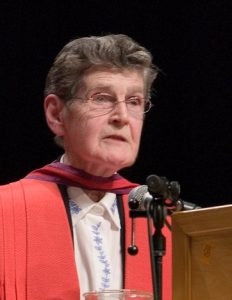 Her love for all humanity was not confined to her choral work. She has been a tireless advocate of the dignity of the homeless, the poor, and the physically and mentally frail. She initiated a multi-faith committee that crossed denominational boundaries to spearhead the distribution of food and clothes to the less fortunate in the City of St. John’s.
Her love for all humanity was not confined to her choral work. She has been a tireless advocate of the dignity of the homeless, the poor, and the physically and mentally frail. She initiated a multi-faith committee that crossed denominational boundaries to spearhead the distribution of food and clothes to the less fortunate in the City of St. John’s.
(Oration honouring Sister Kathrine Bellamy for the degree of Doctor of Laws, honoris causa, bestowed by Memorial University, 2006)
Two years after accepting her honorary degree from Memorial University of Newfoundland, Sister Kathrine agreed to be interviewed by Liz Burge. The setting was a comfortable room in the Convent of Our Lady of Mercy near her beloved church, the Basilica of St. John the Baptist. The atmosphere of peace in the room contrasted with the content of her stories of community, poverty and seeking resources to lend comfort and dignity to the lives of people on her watch.
Born in Bay Roberts, Newfoundland, Sr. Kathrine died on March 23, 2010 at the age of 86. Music was a feature of her household that helped form her, for her father, who came from England, taught her English folk songs. Her mother’s Irish lineage embraced generations of musicians. She had “an extraordinarily fine soprano voice and was an accomplished pianist.” Living in an era before television when people provided their own entertainment, Kathrine was exposed to sing-songs at home, and concerts and plays in her town.
Attending boarding school in St. John’s from the age of 12, Kathrine came under the influence of the Sisters of Mercy, who “sparked a real love of learning” and showed by example a life of joyful dedication that appealed to the young girl. At the age of eighteen, she decided to enter the novitiate of the Sisters of Mercy. Although she had wanted to be a math teacher, she was to become a brilliant musician and social activist instead: “Music gifted me,” she said with characteristic modesty.
Assigned to Our Lady of Mercy College, Kathrine learned to teach and also to conduct music with Sisters who were gifted musicians. By 1960, she was in charge of all classroom choirs in the school, as well as the Mercy Glee Club choir, which won accolades and wide recognition. This, Sr. Kathrine attributed to the “astonishingly sympathetic and supportive accompaniment” of Sr. Celine Veitch. Her own flair for teaching singing created choirs of young people and won, for example, the prestigious Mathieson Trophy in 1965 for the best junior choir in Canada….
Read the complete article here